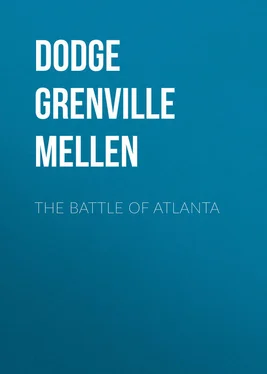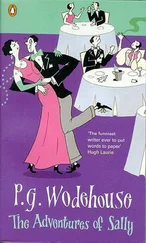Grenville Dodge - The Battle of Atlanta
Здесь есть возможность читать онлайн «Grenville Dodge - The Battle of Atlanta» — ознакомительный отрывок электронной книги совершенно бесплатно, а после прочтения отрывка купить полную версию. В некоторых случаях можно слушать аудио, скачать через торрент в формате fb2 и присутствует краткое содержание. Жанр: foreign_antique, foreign_prose, на английском языке. Описание произведения, (предисловие) а так же отзывы посетителей доступны на портале библиотеки ЛибКат.
- Название:The Battle of Atlanta
- Автор:
- Жанр:
- Год:неизвестен
- ISBN:нет данных
- Рейтинг книги:4 / 5. Голосов: 1
-
Избранное:Добавить в избранное
- Отзывы:
-
Ваша оценка:
- 80
- 1
- 2
- 3
- 4
- 5
The Battle of Atlanta: краткое содержание, описание и аннотация
Предлагаем к чтению аннотацию, описание, краткое содержание или предисловие (зависит от того, что написал сам автор книги «The Battle of Atlanta»). Если вы не нашли необходимую информацию о книге — напишите в комментариях, мы постараемся отыскать её.
The Battle of Atlanta — читать онлайн ознакомительный отрывок
Ниже представлен текст книги, разбитый по страницам. Система сохранения места последней прочитанной страницы, позволяет с удобством читать онлайн бесплатно книгу «The Battle of Atlanta», без необходимости каждый раз заново искать на чём Вы остановились. Поставьте закладку, и сможете в любой момент перейти на страницу, на которой закончили чтение.
Интервал:
Закладка:
General McCullough, in attacking from the west, struck General Jeff C. Davis's Division. Davis had a Division of troops that had been thoroughly drilled. He was a very competent officer and handled them with great skill, and the attack of McCullough and McIntosh, though desperate, was without avail, both rebel commanders being killed in the attack, which took all the fight out of the Arkansas troops and made their attacks towards evening of very little effect. Davis pursued them so energetically that after the death of their commanders they straggled off towards Arkansas and no more fighting occurred on that flank.
General Siegel's two Divisions had remained facing Sugar Creek. General Curtis had endeavored to bring them forward, but without avail. A Brigade of General Osterhaus's Division aided General Davis during the latter part of the day, but the Brigade from Asboth's Division did not get into line to help Carr until nearly dark, although General Curtis went in person for them. Colonel Carr's troops had been marching two nights before the battle, and on the night of the 7th he asked General Curtis to relieve them, so they could get some sleep. General Curtis promised they should be relieved by one of General Siegel's Divisions, but they held the line all that night right where they were formed, and when we looked for our relief the next morning we learned that General Siegel and his troops were nearly a mile in our rear, taking their breakfast.
The general plan of General Curtis's attack on the morning of the 8th was for a combined movement on Price's Army by both of General Siegel's Divisions, and General Davis, who had been brought over to our front, holding Carr's Division in reserve. We waited a long time for General Siegel to get into position; and in fact before he got into position Colonel Carr had been brought out from the reserve and placed on the right of Davis. The enemy opened out upon us, and my Brigade holding the right I commenced swinging my line in over the ground I had fought over the day before, and discovered that the enemy were withdrawing from us; were not standing and giving battle; and the fighting on the morning of the 8th was merely a fight of Price's rear-guard to enable him to withdraw by the Huntsville road, he having received orders that morning from Van Dorn to do so, Van Dorn notifying Price that this was necessary, as the Arkansas troops, after the death of McCullough and McIntosh, had most of them retreated to the south, leaving Price's Army the only force intact in our rear, so that he now had the difficult problem of getting away from us.
The fighting lasted but a short time, mostly with artillery, and occasioned very little loss for that day. We soon discovered the rebels fleeing over the hills and down the White River Road, and being nearest to that road I immediately started my Brigade after them. I had not proceeded far when I received an order from General Curtis to return and hold the battle-field. I was a good deal astonished at this, as I could see the enemy demoralized in my front, with their baggage-trains and their artillery, and I had no doubt, (as I knew the country, having had a detachment stationed at Blackburn's Mills, at the crossing of White River, supplying our Army with forage and grain before the battle,) that I could capture this portion of the army before it could make a crossing of White River.
When I arrived on the battle-field General Curtis told me that General Siegel and his Divisions had gone to the rear towards Cassville; in fact, I myself heard him give one of the Brigades that was passing an order to halt there, which they did not obey, but kept on. General Siegel wrote back advising Curtis to form his new line in the rear of Cross Timbers, as Van Dorn might return to the fight, but Curtis instructed Colonel Carr's Division to remain on the field and hold it, which it did. General Curtis afterwards made very severe complaints to General Halleck of the actions of General Siegel, and in answer General Halleck wrote as follows:
I was by no means surprised at General Siegel's conduct before the battle of Pea Ridge. It was plainly in keeping with what he did at Carthage and Wilson's Creek. After your expedition started I received documentary proof from Captains Sturgis, Schofield, and Totten, and a number of other officers, in regard to his conduct on those occasions, which destroyed all confidence in him. It was for that reason that I telegraphed to you so often not to let Siegel separate from you. I anticipated that he would try to play you a trick by being absent at the critical moment. I wished to forewarn you of the snare, but I could not then give you my reasons. I am glad you prevented his project and saved your army. I cannot describe to you how much uneasiness I felt for you. You saved your army and won a glorious victory by refusing to take his advice.
Captain Kinsman, of Company B, Fourth Iowa, who was holding Pea Ridge, and witnessed the battle from that point, and could look down upon Carr's Division, described the battle in the rear as follows:
At 8:30 o'clock Colonel Dodge opened the ball, and the battle was soon raging all along the line with a fierceness and obstinacy which omened a terrific struggle. The weather was splendid, and the smoke instead of hanging murkily among the trees, rose rapidly and rolled away over the hills in dense sulphurous masses. The thunder of the artillery was terrific, and the shot and shell hissed and screamed through the air like flying devils, while the infantry of both armies, with their rifles, shot-guns, and muskets, kept a perfect hurricane of death howling through the woods. The rebels fought well, but generally fired too high, and their batteries, although getting our range accurately, missed the elevation much of the time. Their poor shooting was our salvation. Had they done as well as our men, with the tremendous odds against us, they must have annihilated us. The enemy were clear around our right flank, enveloping us, and it looked as though they would capture Dodge's Brigade, when Colonel Dodge took a battalion of Colonel Carr's regiment, the Third Illinois cavalry, and charged the forces that were turning our right flank like a whirlwind. Everything gave way before them. Every man in that battalion seemed to ride for his life, and they swept way around our front, routing and demoralizing that flank of the enemy, and effectually freeing our rear and flank. Price told some of our boys of the Fourth Iowa who were captured on the day of the fight and have since escaped, that we fought more like devils than human beings. The rebel colonels (several of them) inquired of our boys who those black-coated fellows were, and who led them. They said there must have been at least 3,000 of them. When the boys told them there were less than 600 of them, the Colonels said they needn't tell them any such stuff as that; that they knew it was a damned lie. But they sent their compliments to Colonel Dodge for the bravery of himself and his command, and well they might, for opposed to Colonel Dodge's Brigade of 1,050 men, and two guns of the First Iowa Battery, were six regiments of Confederate troops, a large force of Confederate Missouri State troops, and eighteen guns, and many of these Confederate troops were the men who did the hard fighting at the Wilson Creek battle. All day, from 8:30 in the morning till 5:30 at night, Dodge's Brigade held its ground, dealing death into the rebel ranks, and, when dark came, with ammunition expended, the Fourth Iowa walked away from the field in good order, with the sullen savage tread of men who might be driven by main strength, but could not be conquered. Although this was one of the first battles of the war, the Northern men showed their desperate fighting qualities; and on the second day the South met and faced great slaughter.
Fayel, the correspondent of the Missouri Democrat, gives this account of the part Colonel Eugene A. Carr's Fourth Iowa Division took in the battle at Elk Horn Tavern:
Читать дальшеИнтервал:
Закладка:
Похожие книги на «The Battle of Atlanta»
Представляем Вашему вниманию похожие книги на «The Battle of Atlanta» списком для выбора. Мы отобрали схожую по названию и смыслу литературу в надежде предоставить читателям больше вариантов отыскать новые, интересные, ещё непрочитанные произведения.
Обсуждение, отзывы о книге «The Battle of Atlanta» и просто собственные мнения читателей. Оставьте ваши комментарии, напишите, что Вы думаете о произведении, его смысле или главных героях. Укажите что конкретно понравилось, а что нет, и почему Вы так считаете.












